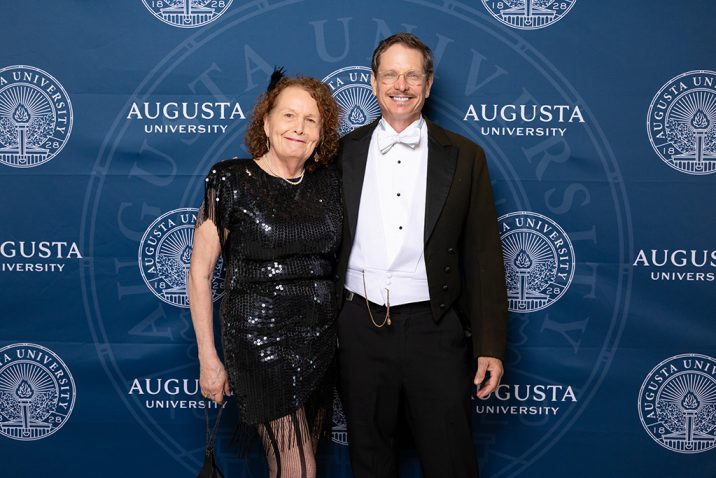Intelligence and Security Studies
With a master’s in Intelligence and Security Studies, you’ll be prepared for a career addressing security challenges in areas like intelligence analysis and strategic security policy.
Graduates can use the degree for advancement in the military, law enforcement and academia.
By choosing to earn your Master of Arts in Intelligence and Security Studies at Augusta University’s Pamplin College of Arts, Humanities, and Social Sciences, you’ll be joining a fully-online program that exposes students to both theoretical and practical content in intelligence, strategic cybersecurity and security studies.
Intelligence and Security Studies is for you if you consider yourself
Life-Changing
Life-Saving
Education
Want to learn more about the Intelligence and Security Studies program at Augusta University?
Request InfoWhat You'll Study
Coursework
Students in Augusta University’s Master of Arts with a major in Intelligence and Security Studies program will complete 36 credit hours, including a capstone or thesis.
The program is 100% online and designed to be completed in two years.
Curriculum | Admissions Criteria | Tuition and Fees | Application Deadlines



EXPLORE. EXCEL. EXPAND.
Graduate School Advantage
Augusta University's graduate programs are among the best in the nation – and the world – and our graduate students are our most valuable assets. To ensure that our students earn more than a degree, the Graduate School offers a range of opportunities so they can develop the leadership, communication and personal skills needed for a rewarding life and academic, research or professional career.
See what the Graduate School has to offer »
About the Graduate SchoolExperience-based Education
Outside the Classroom
The Georgia Cyber Information Warfare Internship program is a collaboration between the Georgia Cyber Center and the Intelligence and Security Studies program that provides opportunities for qualifying students to collaborate on research for the U.S. military, the Department of Defense and state law enforcement.
The nearby Georgia Cyber Center includes incubator/accelerator space for entrepreneurial cyber security companies, research labs, a 340-seat auditorium for public and private events and one of the nation’s few state-owned cyber ranges.
The city of Augusta is home to several high-profile cyber organizations, providing excellent networking and professional development opportunities.
Fully Online
The program’s online nature allows working professionals to advance their career goals while remaining employed.
Focused Education
Built around three central themes — intelligence, strategic cybersecurity and security studies — students build a solid foundation of knowledge and experience applicable to a wide variety of environments.
Publication Opportunities
Students have the opportunity to enhance their resumes by publishing scholarly articles and research.
Military Friendly
A partnership with the U.S. Army Cyber Center of Excellence allows service members to complete their degrees online.
Your Future
Career Options
The Master of Arts in Intelligence and Security Studies prepares students for careers within military intelligence, industry security and academia. Potential careers include:
Profiles
Student Stories
This program encourages you to see the world without its filters and trains you to look at its problems directly and unflinchingly.
Jaiden Mallika Le Pax
There is no other program exactly like this in the country. National and global politics, as well as United States national security, have always been of great interest to me, so this program was a natural fit.
Monty Philpot Brock
Admissions Criteria at a Glance
GPA: Overall GPA of 2.7 on a 4.0 scale at the Baccalaureate level calculated on all undergraduate work OR an overall GPA of 3.0 on a 4.0 scale at the graduate level calculated on all graduate work attempted.
Degree Requirement: Minimum of a Bachelor’s degree or equivalent from an accredited college or university.
Transcripts: Official transcripts are required from all universities and colleges ever attended. Unofficial transcripts from US colleges and universities can be used in the admissions review process in lieu of official transcripts for this program.
Standardized Test Requirements: None are required for this program.
Letters of Recommendation: Recommendations from three individuals are required. Only recommendations submitted through the online application portal will be accepted.
Resume: Applicants must submit an updated resume or curriculum vitae. Resumes must be submitted within the application status portal after the application is submitted.
International Students: Please review the verification process for international transcripts and the english proficiency requirement.
Tuition & Fees Estimate
$2,821*
Estimated total
Full-time / In-State / Per Semester
$236
Tuition Per Hour
$675
Mandatory Fees
View Detailed Program Tuition
*Tuition & Fees listed here are for in-state students enrolling in the university for Fall 2024 semester.
Detailed Program Tuition InformationApplication Deadlines
Spring '24 Application Deadline
- November 15, 2023
Summer '24 Application Deadline
- April 1, 2024
Fall '24 Application Deadline
- July 1, 2024
Early submission of all application materials is strongly advised.
All required application materials and documents must be received in order for an application to be considered complete and before an admission decision can be made. The program does not accept applications after the published application deadline, however the program will continue to accept application materials up to 2 weeks after the application deadline.

Why Augusta?
Launched in 2018, the program’s enrollment has grown by more than 450 percent, with a quarter of the students having Department of Defense affiliations. Since the program is 100% online, you can pursue the degree whether you’re in the military or working full-time.
The capstone project connects you with experienced mentors that advance your understanding of strategic concepts and challenges.
Augusta University’s relationships with the Georgia Cyber Center, the U.S. Army Cyber Center for Excellence and other military and civilian enterprises built around intelligence and security provide excellent networking opportunities that can have a positive impact on your career choices.

Longtime educator enjoyed ‘planting seeds and watching them grow'
Longtime educator enjoyed ‘planting seeds and watching them grow'
Pamplin professor examines future of energy and AI in new paper
Pamplin professor examines future of energy and AI in new paper

